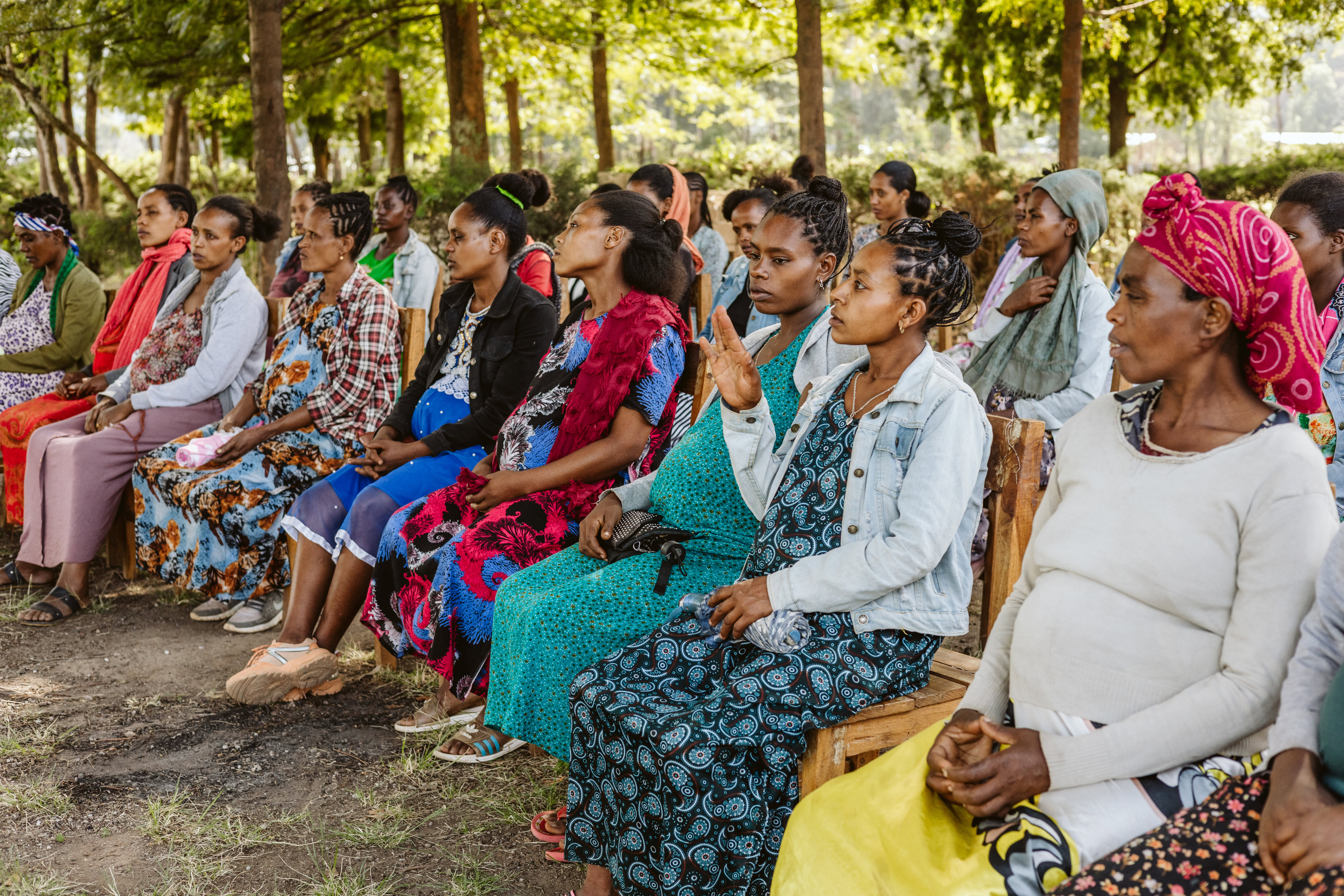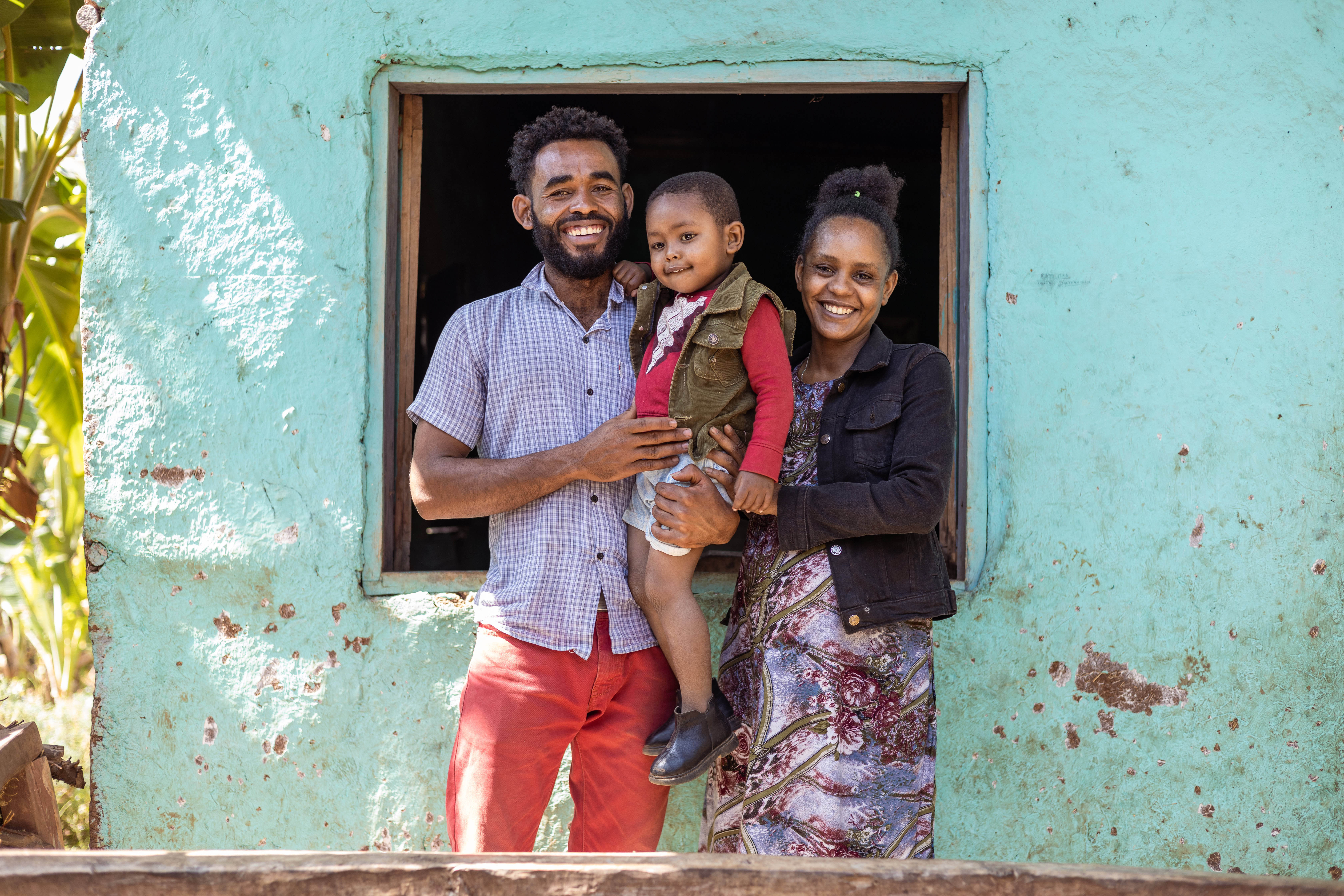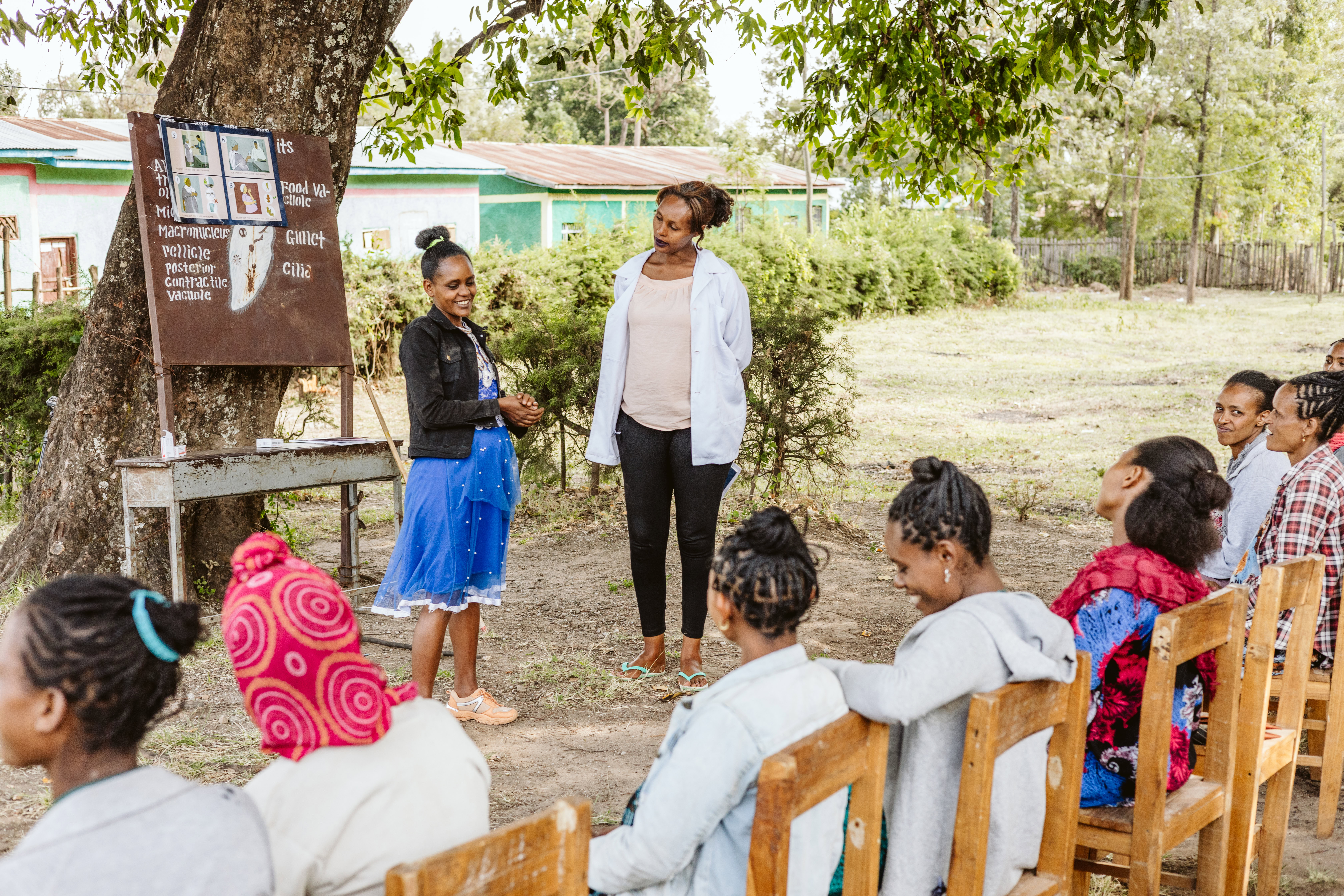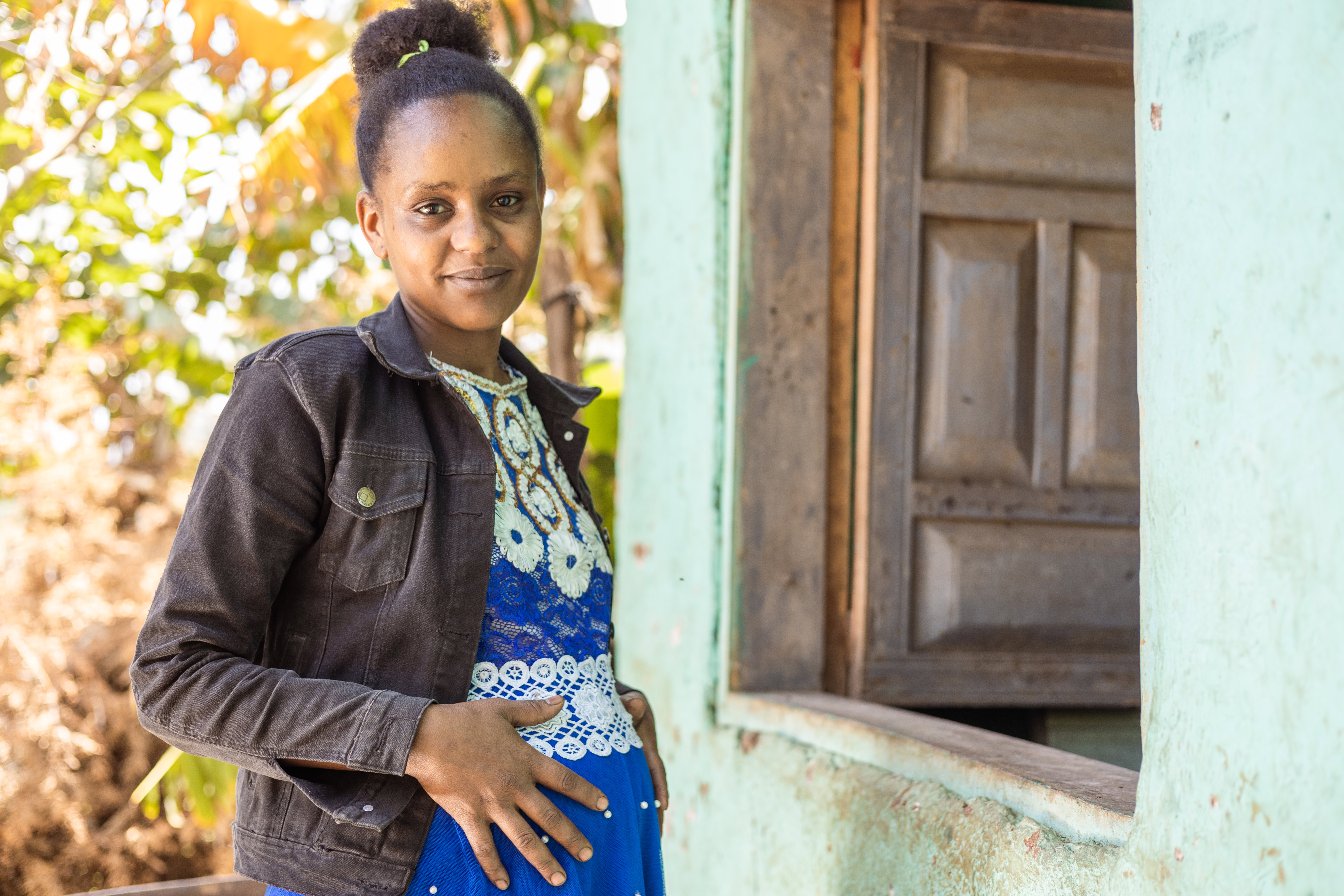Field Stories
Ten inspiring global nutrition stories
December 17, 2024
WP_Term Object
(
[term_id] => 49
[name] => Field Stories
[slug] => all-field-stories
[term_group] => 0
[term_taxonomy_id] => 49
[taxonomy] => news-category
[description] => Discover the personal stories of people whose lives have been impacted by better nutrition, and those working tirelessly to deliver it.
[parent] => 0
[count] => 181
[filter] => raw
)
Women at the heart of pregnancy care in Ethiopia
In rural Ethiopia, "pregnant women’s conferences" provide a platform for women to share experiences, support each other, gain vital knowledge, and change the course of maternal health in their communities.
Posted on January 30, 2025
Dinkinesh speaks to a group of women gathered during a pregnant women's conference in her community.
Every month, the village health post in Aze Debo hosts a pregnant women’s conference, where about 20 expectant mothers are welcomed as VIPs. They settle in the shade under trees awaiting the midwife who will facilitate the session and share crucial information for women and their babies.
To an outsider, the gathering might seem like a typical village meeting. But the word “conference” is intentional — it gives the event a sense of importance that motivates women to attend. And the stakes are high. Providing expectant mothers with knowledge and access to services and a platform to share experiences is key to improving maternal and newborn health and nutrition, both in this southern Ethiopian community and nationwide.
“Other women shared stories from their pregnancies. I loved the personal testimonies.
— Dinkinesh, Pregnant women’s conference attendee
The country has made notable strides in reducing maternal and neonatal mortality, yet significant challenges persist. UNICEF studies reveal that and one in 267 women in Ethiopia die from pregnancy-related complications, one in 38 newborns die within their first four weeks, and one in 28 newborns do not survive to their first birthday. According to the World Health Organization, delays in seeking care account for 40 percent of maternal deaths mainly due to lack of adequate knowledge to support decision making in seeking care, while 22 percent are due to delays in receiving appropriate care at the health facility.
Wondwosen Retta is a Senior Program Officer for Maternal and Newborn Health and Nutrition with Nutrition International in Ethiopia. Part of his role is ensuring the quality of the monthly meetings. “Pregnancy complications often come from not having enough information about proper nutrition and healthy practices,” he explains — practices that include iron and folic acid supplementation, early and continued antenatal care, and delivery with a skilled birth attendant. “The conferences allow us to reach many women, giving them the support they need for a healthy pregnancy.”
Launched by the Ministry of Health in 2013, pregnant women’s conferences promote the use of antenatal services at government health centres. In 2017, the program was revamped in partnership with Nutrition International to engage women, families, and communities in maternal health discussions, with a focus on driving lasting behaviour change.

In collaboration with the ministry, Nutrition International developed a facilitation guide to structure the sessions and support community dialogue. The guide included visuals to enhance understanding and was accompanied by training for midwives to strengthen their facilitation skills. Monitoring and reporting tools were also introduced to improve the quality of conference sessions and documentation. This updated approach is now implemented across four states where Nutrition International operates: Amhara, Oromia, Sidama, and the Southern Nations, Nationalities, and Peoples’ Region (SNNPR).
Over a series of four sessions, participants explore how to best take care of their health and nutrition while pregnant, how to prepare for the birth, address barriers in health-seeking behaviour, and learn about recognizing danger signs in newborns and immediate actions. At its core, the gatherings provide a space for women to come together, use their voices, and support each other on the pathway to accessing quality health and nutrition services.
In the village of Aze Debo, within the Kedida Gamela ward of SNNPR, Dinkinesh Tegegn welcomes us warmly into her home for an interview. Like many in this rural community, her source of livelihood is farming. While her husband teaches at the local primary school, she works the land, manages the household and looks after her three-year-old son.

Dinkinesh began attending the conference during her second pregnancy after hearing about it from outreach workers and other expectant mothers. She wanted to learn how to monitor her pregnancy: how to recognize danger signs in pregnancy and know when to seek help. Although she had given birth once, this information was new to her.
“Most women in my village visit the health post only when they are ill,” says Dinkinesh, recalling that discomfort in her abdomen was her first sign of pregnancy with her first child. “I assumed everything was normal unless I felt sick. I didn’t go for antenatal care and wasn’t prepared for childbirth.”

With a second child on the way, she committed to attending every session of the Aze Debo conference and staying on top of her antenatal appointments. At the clinic, a midwife offered nutritional counselling, supplements, information about delivery facilities, and the emergency ambulance number. While Dinkinesh followed all the advice, what she found most valuable about the conference was hearing from her peers.
“Other women shared stories from their pregnancies. I loved the personal testimonies,” she says.
Each story was unique. Some women spoke about finding it difficult to take the iron and folic acid supplements consistently. Others recounted experiences with preterm delivery, low birthweight, or the challenges of giving birth at home. These stories shed light on potential risks as well as solutions, and for Dinkinesh, they were what drew her to the sessions and what stayed with her afterwards.
The pregnant women’s conference is designed to be interactive and dynamic. Personal testimonies are followed by reflection and group discussions, with a specific call to action. Each participant commits to adopting a new healthy practice for the month ahead. Dinkinesh shares an example: “If you normally eat three times a day, you should aim for four or five meals daily during pregnancy. And not just injera! You need to include nutritious foods like kale, carrots, and avocado.” (Injera is a fermented flatbread and a staple in Ethiopia.)
Dinkinesh has the family backing she needs to put this advice into practice. When she leaves her antenatal visits with iron and folic acid supplements in hand, she knows her husband will remind her to take them. They balance household chores, and he does the heavy lifting — fetching water and preparing food for the animals.
But as Retta points out, not all women can rely on this kind of help during pregnancy. “Expectant mothers need proper care, nutrition, and rest, but many women in Ethiopia bear a heavy burden of responsibility for their households. At the same time, they lack decision-making power over their own health and how resources are spent.”
Retta explains that pregnant women’s conferences aim to dismantle these barriers by challenging social norms around maternal and newborn health. The goal is to meaningfully empower women, enhance their sense of agency, and increase the support they receive from husbands, families, and communities.
The day before each monthly session, community health workers go door-to-door to remind women to attend. Convincing husbands can be more difficult, though their presence is equally important. To encourage their participation, the program enlists religious leaders and village elders—trusted figures in the community. These leaders attend the sessions and deliver key messages that dispel pregnancy-related myths and food taboos, which can increase the risk of conditions like iron-deficiency anaemia. In Orthodox Christian communities, for example, fasting is common. When a church authority advises against fasting for pregnant women, families are more likely to follow the guidance.
Since its redesign in 2017, the program has steadily garnered attention from the government as a key initiative for improving maternal and newborn health. Retta considers it lifesaving, delivering vital information in a culturally sensitive, easy-to-understand way. While there is much work to be done to shift gender norms, he sees signs of progress.

“Some husbands show their support by taking care of the household so women can attend the sessions,” says Retta. “Others accompany their wives to the conferences, bringing their young children along.”
When asked if her second pregnancy felt different from the first, Dinkinesh responds emphatically: “Yes,” both physically and emotionally. Now a mother to two healthy children, she is open to returning to the group to share her experience.
“My advice would focus on the benefits I received — iron and folic acid tablets, hygiene information and nutritional counselling,” she says. “I also want to encourage women to deliver at a health facility, where they can get proper medication and support.”
This support extends well beyond delivery. Through the conferences, women are introduced to postnatal services that guide breastfeeding, newborn care, and timely vaccinations. Ultimately, the goal is to build a supportive environment for women and babies. One where women contribute their lived experiences and learn from one another as they receive quality health and nutrition knowledge, skills and support.
Learn more about our work in Ethiopia.